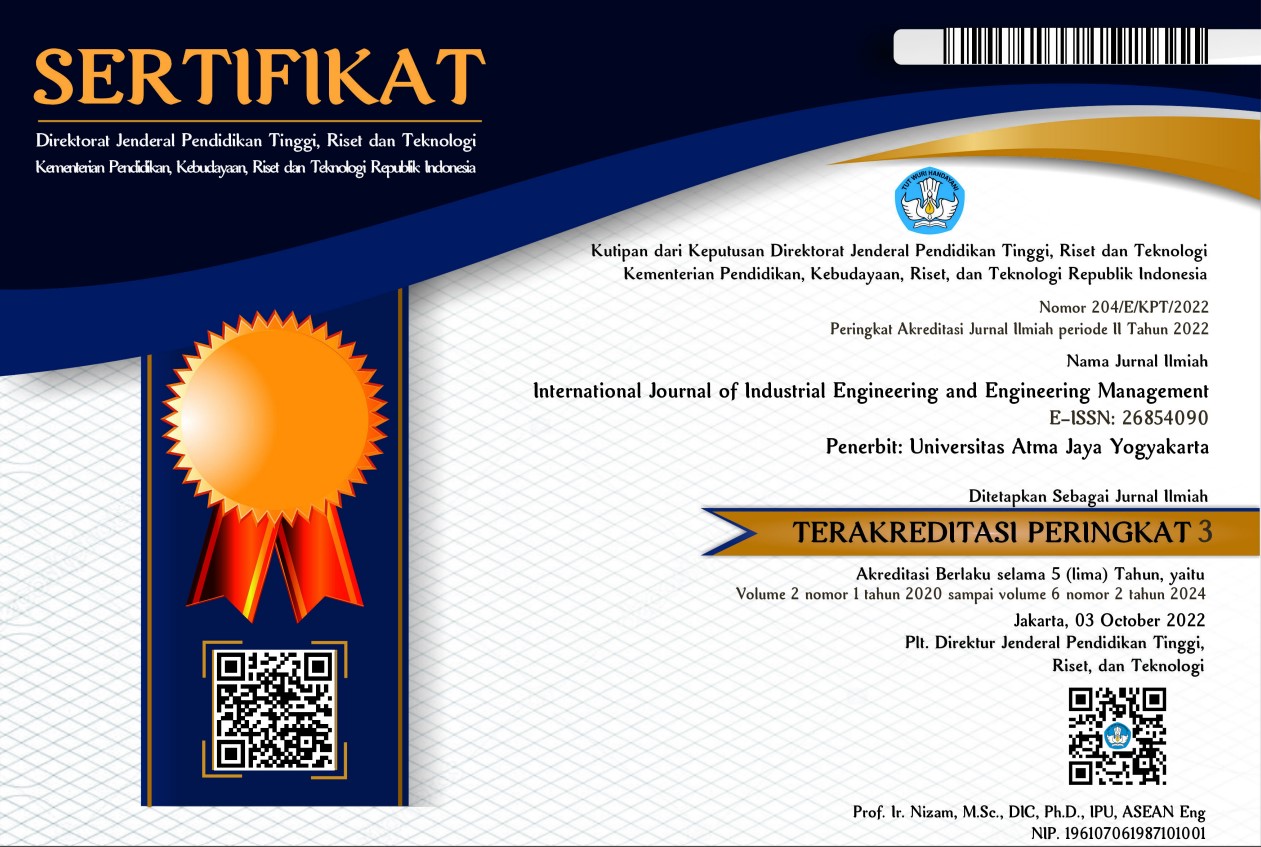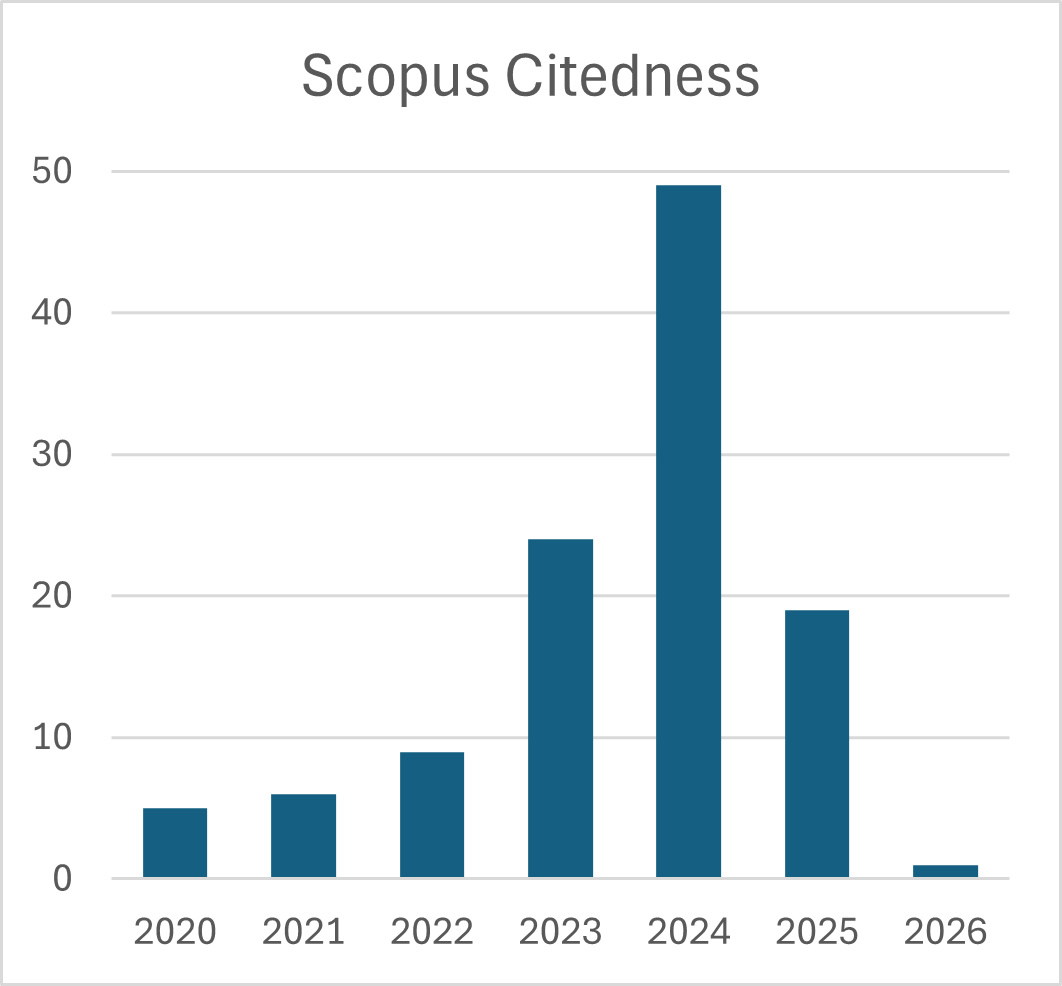Techniques for Improving Genetic Algorithms in Solving Operating Room Scheduling Problems: An Integrative Review
DOI:
https://doi.org/10.24002/ijieem.v6i1.8903Keywords:
operating room scheduling, scheduling complexity, improved genetic algorithm, integrative reviewAbstract
Operating room scheduling is a complex process that involves various resources and takes the interests of many parties into consideration. The genetic algorithm is the frequently used metaheuristic algorithm to solve a large-size operating room scheduling problem. Many techniques have been developed to improve the genetic algorithms' performance in dealing with the operating room scheduling complexity. In this paper, we survey available literature to identify improvement techniques used at each stage of the genetic algorithm and capture the underlying problems. This review provides a mapping of improvement techniques in genetic algorithms correlating with the considered problems. The results can be employed by other researchers as a guide for future research in integrating a genetic algorithm or other population-based metaheuristic algorithm with a recent heuristic algorithm following the future directions of operating room scheduling research.
References
Abdalkareem, Z.A., Amir, A., Al-Betar, M.A., Ekhan, P., & Hammouri, A.I. (2021). Healthcare scheduling in optimization context: a review. Health and Technology, 11(3), 445–469
Ab Wahab, M.N., Nefti-Meziani, S., & Atyabi, A. (2015). A comprehensive review of swarm optimization algorithms. PLoS ONE, 10(5), e0122827
Allahverdi, A. (2016). A survey of scheduling problems with no-wait in process. European Journal of Operational Research, 255(3), 665-686
Belkhamsa, M., Jarboui, B., & Masmoudi, M. (2018). Two metaheuristics for solving no-wait operating room surgery scheduling problem under various resource constraints. Computers & Industrial Engineering, 126, 494–506
Britt, J., Baki, M.F., Azab, A., Chaouch, A., & Li, X. (2021). A stochastic hierarchical approach for the master surgical scheduling problem. Computers & Industrial Engineering, 158, 107385
Conforti, D., Guerriero, F., & Guido, R. (2010, 18-20 February). A multi-objective block scheduling model for the management of surgical operating rooms: new solution approaches via genetic algorithms. 2010 IEEE Workshop on Health Care Management (WHCM), Venice, Italy. IEEE, p. 1-5
Erdem, E., Qu, X., & Shi, J. (2012). Rescheduling of elective patients upon the arrival of emergency patients. Decision Support Systems, 54(1), 551-563
Ewen, H., & Mönch, L. (2014). A simulation-based framework to schedule surgeries in an eye hospital. IIE Transactions on Healthcare Systems Engineering, 4(4), 191-208
Fei, H., Meskens, N., & Chu, C. (2006, 25-27 October). An operating theatre planning and scheduling problem in the case of a "block scheduling" strategy [Paper presentation]. 2006 International Conference on Service Systems and Service Management, Troyes, France. p. 422-428
Fei, H., Meskens, N., & Chu, C. (2010). A planning and scheduling problem for an operating theatre using an open scheduling strategy. Computers & Industrial Engineering, 58(2), 221–230
Guido, R., & Conforti, D. (2017). A hybrid genetic approach for solving an integrated multi-objective operating room planning and scheduling problem. Computers and Operations Research, 87, 270–282
Guo, M., Wu, S., Li, B., & Song, J. (2016). Integrated scheduling of elective surgeries and surgical nurses for operating room suites. Flexible Services and Manufacturing Journal, 28, 166–181
Hamid, M., Nasiri, M.M., Werner, F., Sheikhahmadi, F., & Zhalechian, M. (2019). Operating room scheduling by considering the decision-making styles of surgical team members: a comprehensive approach. Computers & Operations Research, 108, 166-181
Hillier, F.S., & Lieberman, G.J. (2010). Introduction to Operations Research (9th ed). McGraw-Hill.
Hooshmand, F. , MirHassani, S.A., & Akhavein, A. (2018). Adapting GA to solve a novel model for operating room scheduling problem with endogenous uncertainty. Operations Research for Health Care, 19, 26-43
Korani, W., & Mouhoub, M. (2021). Review on nature-inspired algorithms. SN Operations Research Forum, 2(3), 1-26
Latorre-Núñez, G., Lüer-Villagra, A., Marianov, V., Obreque, C., Ramis, F., & Neriz, L. (2016). Scheduling operating rooms with consideration of all resources, post anesthesia beds and emergency surgeries. Computers & Industrial Engineering, 97, 248–257
Lee, S., & Yih, Y. (2014). Reducing patient-flow delays in surgical suites through determining start-times of surgical cases. European Journal of Operational Research, 238(2), 620–629
Lin, Y. K., & Chou, Y. Y. (2020). A hybrid genetic algorithm for operating room scheduling. Health Care Management Science, 23, 249–263
Lu, Q., Zhu, X., Wei, D., Bai, K., Gao, J., & Zhang, R. (2019). Multi-phase and integrated multi-objective cyclic operating room scheduling based on an improved NSGA-II approach. Symmetry, 11(5), 599
Marques, I., & Captivo, M.E. (2015). Bicriteria elective surgery scheduling using an evolutionary algorithm. Operations Research for Health Care, 7, 14-26
Marques, I., Captivo, M.E., & Vaz Pato, M. (2014). Scheduling elective surgeries in a Portuguese hospital using a genetic heuristic. Operations Research for Health Care, 3(2), 59–72
Rivera, G., Cisneros, L., Sánchez-Solís, P., Rangel-Valdez, N., & Rodas-Osollo, J. (2020) Genetic algorithm for scheduling optimization considering heterogeneous containers: a real-world case study. Axioms, 9(1), 27
Roland, B., Di Martinelly, C., & Riane, F. (2006, 25-27 October). Operating theatre optimization: a resource-constrained based solving approach. 2006 International Conference on Service Systems and Service Management, Troyes, France. IEEE, p. 443-448
Roland, B., Di Martinelly, C., Riane, F., & Pochet, Y. (2010). Scheduling an operating theatre under human resource constraints. Computers & Industrial Engineering, 58(2), 212-220
Samudra, M., Van Riet, C., Demeulemeester, E., Cardoen, B., Vansteenkiste, N., & Rademakers, F.E. (2016). Scheduling operating rooms: achievements, challenges and pitfalls. Journal of Scheduling, 19, 493–525
Santoso, L.W., Sinawan, A.A., Wijaya, A.R., Sudiarso, A., Masruroh, N.A., & Herliansyah, M.K. (2017). Operating room scheduling using hybrid clustering priority rule and genetic algorithm. AIP Conference Proceeding, 1902(1), 020033
Souki, M. (2011). Operating theatre scheduling with fuzzy durations. Journal of Applied Operational Research, 3(3), 177–191
Souki, M., & Rebai, A. (2010). Heuristics for the operating theatre planning and scheduling. Journal of Decision Systems, 19(2), 225-252
Souki, M., Youssef, S.B., & Rebai, A. (2009, 06-09 July). Memetic Algorithm for operating room admissions. 2009 International Conference on Computers & Industrial Engineering, Troyes, France. IEEE, p. 519-524
Souza, M. T. de., Silva, M. D. da., & Carvalho, R. de. (2010). Integrative review: what is it? How to do it?. Einstein (são Paulo), 8(1), 102–106
Timucin, T., & Birogul, S. (2018, 19-21 October). Implementation of Operating Room Scheduling with Genetic Algorithm and the Importance of Repair Operator. 2018 2nd International Symposium on Multidisciplinary Studies and Innovative Technologies (ISMSIT), Ankara, Turkey. IEEE, p. 1-6
Vali-Siar, M. M., Gholami, S., & Ramezanian, R. (2018). Multi-period and multi-resource operating room scheduling under uncertainty: a case study. Computers & Industrial Engineering, 126, 549–568
Wang, D., Liu, F., Yin, Y., Wang, J., & Wang, Y. (2015). Prioritized surgery scheduling in face of surgeon tiredness and fixed off-duty period. Journal of Combinatorial Optimization, 30, 967–981
Wang, J.J., Dai, Z., Chang, A.C., & Shi, J.J. (2022). Surgical scheduling by fuzzy model considering inpatient beds shortage under uncertain surgery durations. Annals of Operations Research, 315, 463–505
Wang, K., Qin, H., Huang, Y., Luo, M., and Zhou, K. (2021). Surgery scheduling in outpatient procedure center with re-entrant patient flow and fuzzy service times. Omega, 102, 102350
Whittemore, R., & Knafl, K. (2005). The integrative review: updated methodology. Journal of Advanced Nursing, 52(5), 546–553
Wu, Q., Xie, N., & Shao, Y. (2020). Day surgery appointment scheduling with patient preferences and stochastic operation duration. Technology and Health Care, 29(4), 697-708
Wu, X., Xiao, X., & Zhang, L. (2018, 29-31 March). Optimizing the three-stage operating room scheduling problem with RVNS-GA. 2018 Tenth International Conference on Advanced Computational Intelligence (ICACI), Xiamen, China. IEEE, p. 729-734
Xing, Y., Li, L., Bi, Z., Wilamowska-Korsak, M., & Zhang, L. (2013). Operations research (OR) in service industries: a comprehensive review. Systems Research and Behavioral Science, 30(3), 300–353
Zhang, B., & Su, Q. (2021). Dynamic surgery scheduling based on an improved genetic algorithm. Journal of Healthcare Engineering, 1559050
Zhu, S., Fan, W., Yang, S., Pei, J., & Pardalos, P.M. (2019). Operating room planning and surgical case scheduling: a review of literature. Journal of Combinatorial Optimization, 37, 757–805
Downloads
Published
How to Cite
Issue
Section
License
Copyright (c) 2024 Deny Ratna Yuniartha, Nur Mayke E. Normasari, Joko Waluyo, Nur Aini Masruroh, Muhammad Kusumawan Herliansyah

This work is licensed under a Creative Commons Attribution 4.0 International License.








